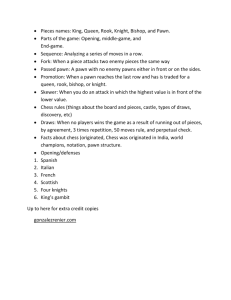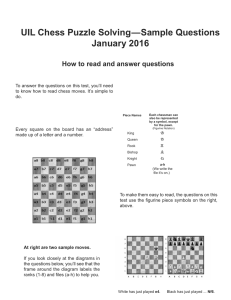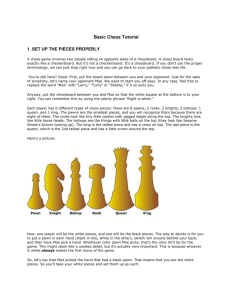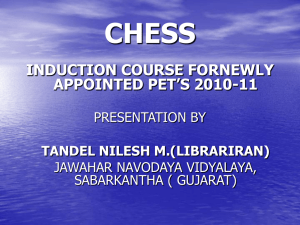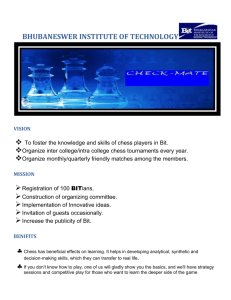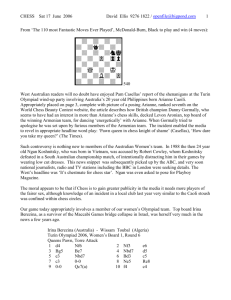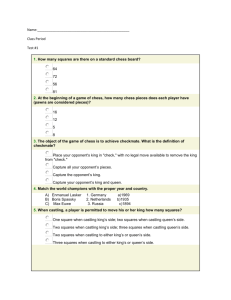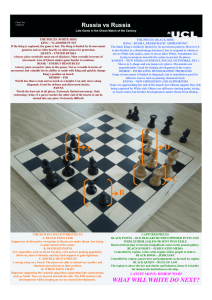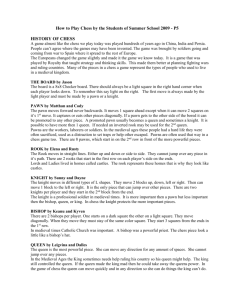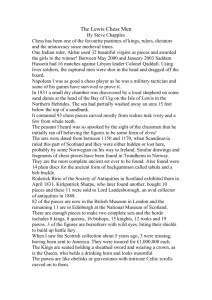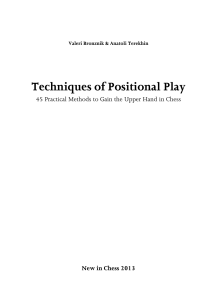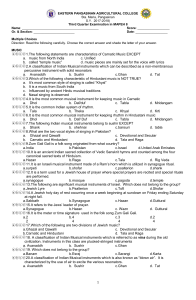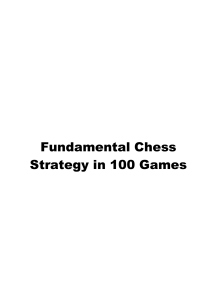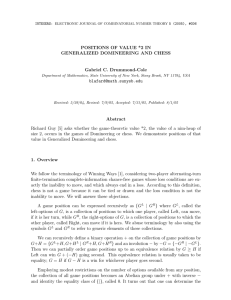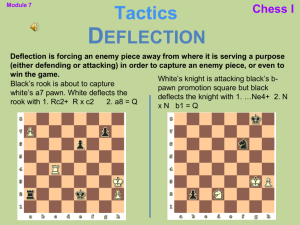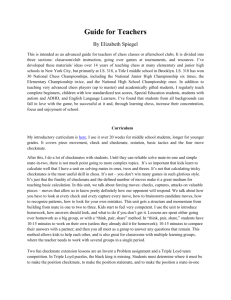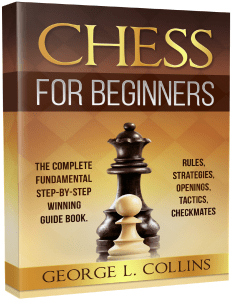recreative skills chess - The Duke of Edinburgh's Hillary Award
advertisement
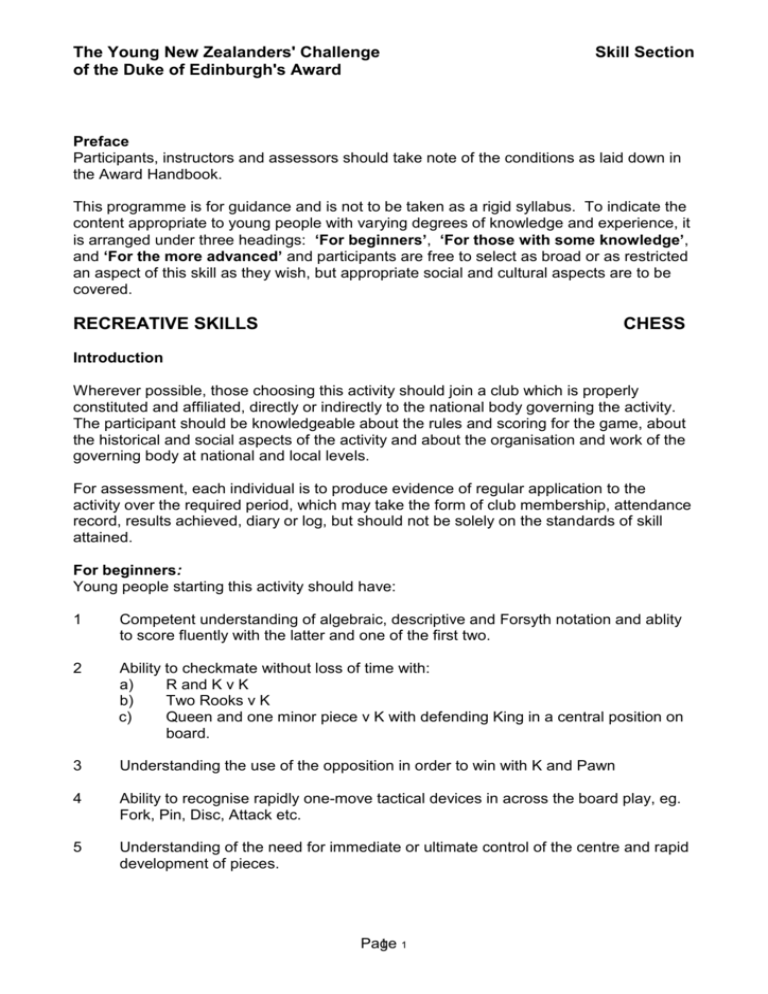
The Young New Zealanders' Challenge of the Duke of Edinburgh's Award Skill Section Preface Participants, instructors and assessors should take note of the conditions as laid down in the Award Handbook. This programme is for guidance and is not to be taken as a rigid syllabus. To indicate the content appropriate to young people with varying degrees of knowledge and experience, it is arranged under three headings: ‘For beginners’, ‘For those with some knowledge’, and ‘For the more advanced’ and participants are free to select as broad or as restricted an aspect of this skill as they wish, but appropriate social and cultural aspects are to be covered. RECREATIVE SKILLS CHESS Introduction Wherever possible, those choosing this activity should join a club which is properly constituted and affiliated, directly or indirectly to the national body governing the activity. The participant should be knowledgeable about the rules and scoring for the game, about the historical and social aspects of the activity and about the organisation and work of the governing body at national and local levels. For assessment, each individual is to produce evidence of regular application to the activity over the required period, which may take the form of club membership, attendance record, results achieved, diary or log, but should not be solely on the standards of skill attained. For beginners: Young people starting this activity should have: 1 Competent understanding of algebraic, descriptive and Forsyth notation and ablity to score fluently with the latter and one of the first two. 2 Ability to checkmate without loss of time with: a) R and K v K b) Two Rooks v K c) Queen and one minor piece v K with defending King in a central position on board. 3 Understanding the use of the opposition in order to win with K and Pawn 4 Ability to recognise rapidly one-move tactical devices in across the board play, eg. Fork, Pin, Disc, Attack etc. 5 Understanding of the need for immediate or ultimate control of the centre and rapid development of pieces. Page 1 1 The Young New Zealanders' Challenge of the Duke of Edinburgh's Award Skill Section For those with some knowledge: Young people should have: 6 Competent understanding of, and ability to score fluently with, algebraic, descriptive and Forsyth notation. 7 Ability to solve without undue loss of time a selected variety of two-move checkmates, of the standard of difficulty found in: * * * * Art of Checkmate - Renaud and Kahn Chess Apprentice - Bot and Morrison How to Force Checkmate - Reinfield Learn Chess, Vol 12 - Winning Methods - Alexander and Beech 8 Understanding of the power of two united passed Pawns, and two passed Pawns on opposite wings (same colour), weakness of double and isolated pawns. Appreciation of power of Rook on seventh Rank. 9 Ability to recognise without undue loss of time, two-move tactical devices of the standard of difficulty found in: * * 10 Winning Chess - Chernev and Reinfield Tactics for Junior-series of pamphlets - Chess Education Society Appreciation of the strategic principles behind two standard openings by White and one specified defence against both 1P-K4 and 1P-Q4. For the more advanced: Those taking part should show: 11 Appreciation of the importance of the centre. 12 Understanding of the strategical need for: a) Attack in centre to counter wing attack. b) Wing attack when centre locked. 13 Understanding of strength and weakness of Pawn formations: a) Weakness of doubled and isolated Pawns b) Weakness of the backward Pawn c) Strength of the Knight outpost and weakness of the ‘hole’. 14 Understanding of weakness of ‘bad’ Bishop and relative values of Bishop and Knight in appropriate end-game situation. 15 Understanding of drawing chances with Bishop and Pawn facing Bishop of opposite colour. 16 Ability to win with King, Rook and Pawn against King and Rook, when defending King is cut off from queening square. Page 2 2 The Young New Zealanders' Challenge of the Duke of Edinburgh's Award Skill Section 17 Ability to draw with King and Rook against King, Rook and Pawn, when defending King controls queening square. 18 Ability to win with King and Queen against King, defending Pawn on seventh rank. Recommended reference books which contain positions of required standard of difficulty Logical Approach to Chess - Euwe: Blaine and Rumble Middle Game in Chess - Fine Basic Chess Endings - Fine How to win in the Chess Endings - Horowitz Page 3 3
